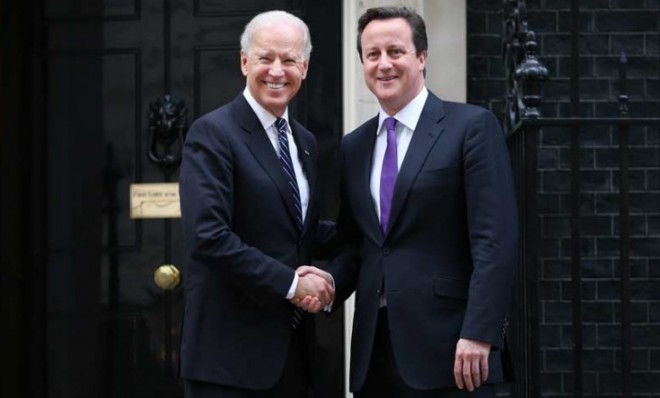British lawmakers back same-sex marriage: Lessons for the GOP
The bill was championed by Prime Minister David Cameron, the leader of the Conservative Party — and he's facing outright rebellion


A free daily email with the biggest news stories of the day – and the best features from TheWeek.com
You are now subscribed
Your newsletter sign-up was successful
Britain's House of Commons voted overwhelmingly on Tuesday to legalize same-sex marriage, all but guaranteeing passage as the bill now heads to the House of Lords. It was a watershed moment for gays in Britain, where public support for same-sex marriage is very strong. And the bill's passage coincided with the arrival in London of Vice President Joe Biden — who famously outed President Obama as a gay marriage supporter last year — a reminder that the gay rights movement in the U.S. has yet to claim what has become the ultimate prize.
The bill was passed with the strong support of Prime Minister David Cameron, leader of the Conservative Party. Facing a predicament that in many ways resembles that of his conservative brethren in the U.S., Cameron has sought to reform the Tories as public opinion shifts away from them on gay marriage. "I am a strong believer in marriage," Cameron said today. "It helps people commit to each other, and I think it is right that gay people should be able to get married, too. This is, yes, about equality. But it is also about making our society stronger."
However, members of his party saw the situation differently. While the bill had more than enough support from Labour and the Liberal Democrats, more than half of Conservative MPs either voted against the bill or abstained, including members of Cameron's own cabinet. The rebellion is being widely seen as a punishing setback for Cameron, even if the vote could put the Conservative Party in a better position, electorally speaking, in elections scheduled for 2015.
The Week
Escape your echo chamber. Get the facts behind the news, plus analysis from multiple perspectives.

Sign up for The Week's Free Newsletters
From our morning news briefing to a weekly Good News Newsletter, get the best of The Week delivered directly to your inbox.
From our morning news briefing to a weekly Good News Newsletter, get the best of The Week delivered directly to your inbox.
Conservative backbenchers made passionate, if respectful, calls for scuttling the bill during a debate in Parliament. "We should be in the business of protecting cherished institutions and our cultural heritage; otherwise what, I ask, is a Conservative Party for?" said backbencher Edward Leigh. "We are alienating people who have voted for us all of their lives, leaving them with no one to vote for."
Sir Gerald Howarth, a Conservative MP who voted no, told The Telegraph, "This is a very serious and a very sensitive issue and is causing deep divisions in the Conservative Party."
While support for same-sex marriage in the U.S. is not as strong as in Britain, it has surged dramatically in recent years, leading some Republican analysts to call on the GOP to get on the right side of popular opinion. If the GOP wants a preview of what that internal battle might look like, they need search no further than across the Atlantic.
A free daily email with the biggest news stories of the day – and the best features from TheWeek.com
Ryu Spaeth is deputy editor at TheWeek.com. Follow him on Twitter.
-
 Why are election experts taking Trump’s midterm threats seriously?
Why are election experts taking Trump’s midterm threats seriously?IN THE SPOTLIGHT As the president muses about polling place deployments and a centralized electoral system aimed at one-party control, lawmakers are taking this administration at its word
-
 ‘Restaurateurs have become millionaires’
‘Restaurateurs have become millionaires’Instant Opinion Opinion, comment and editorials of the day
-
 Earth is rapidly approaching a ‘hothouse’ trajectory of warming
Earth is rapidly approaching a ‘hothouse’ trajectory of warmingThe explainer It may become impossible to fix